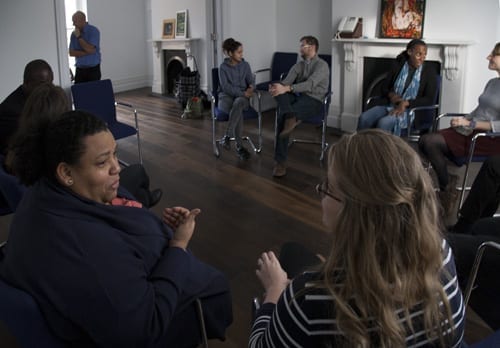Maudsley Charity has funded a ‘Therapeutic Relationships’ course, run by 10 Windsor Walk, a south London-based centre for psychoanalytic psychotherapy, and South London and Maudsley NHS Foundation Trust (SLaM). The course facilitated nurses and an occupational therapist to engage therapeutically with their staff teams and patients, with the aim of improving patient care and staff morale.
The course encouraged an in-depth, psychoanalytic way of thinking about patient treatment and staff relationships, with a focus on reflective practice. As working in a mental health care setting can be emotionally challenging, the aim was to give people the tools to manage their own wellbeing, that of their staff and to reconnect with their patients and their needs.
The 20 week series of lectures, discussion groups and self-directed learning was attended by 30 nurses (Band 5-7) working in diverse clinical settings across various South London NHS services – SLaM, South West London and St. George’s Mental Health NHS Trust and Oxleas NHS Foundation Trust.
“I don’t think I would’ve been able to manage the team as well as I have done”.
Joan Osimuwa is a Ward Manager on an acute female ward in the Ladywell Unit at Lewisham Hospital, where she manages a team of 26 nurses, occupational therapists and administrators, and cares for 16 patients, who are being treated for a range of disorders including psychosis and personality disorder.
“The training was very useful and I’ve been able to use what I learnt to benefit the whole ward. It taught me to look at patients from a psychoanalytical point of view, I have passed this onto my team. Usually nurses are more focused on things like medication and risk, but now they can handle situations and communicate with patients much better. In the end this helps with the patients’ recovery.”
Joan’s staff also say they feel more supported, as she is better equipped to help them when they are upset by challenging patients or situations. “I don’t think I would’ve been able to manage the team as well as I have done without it”.



Assessing underlying factors
Ben Stuart is a Psychiatric Liaison Nurse for Older Adults at King’s College Hospital. His role is to assess and advise on concerns around the mental health of older adults while they are being treated at King’s College Hospital. Working on the wards, he often faces mental illnesses such as depression, delirium and dementia.
“The training has helped me see how a patient’s personal history can influence their current mental health. It’s made me step back from the acute management of a situation, and asses the wider range of factors. This means I can make better decisions about the treatment plan we put in place. For instance, for patients expressing suicidal ideation the course has helped me take a broader view of the acute situation, to understand the adverse factors / stressful situations that may need resolving whilst a person is admitted to hospital for the patient to be able to cope adequately at home.”
Ben has also used what he’s learnt when working with student nurses on their placements: “Away from direct clinical work, the course has given me a framework to use for supervision for student nurses. I feel better able to support students to reflect on how their psychological well-being can be impacted by patients’ emotional distress.”
Rolling out the course
Marcus Evans, one of the Course Tutors said: “The course has been a pleasure because of the input from the participants. Although the mental health system is under pressure a lot of good work is going on. The standard of clinical presentation progressed as the course went on and was impressive”
A previous version of the course ran at SLaM and South Stafford and Shropshire Mental Health Trust for many years with positive results. Once further evaluation of this trial is conducted, the hope is that evidence of its success will see it rolled out more widely.
Help support staff like Ben
"This course means I can make better decisions about the treatment plan we put in place for patients." Ben Stuart, Psychiatric Liaison Nurse
Donate today
